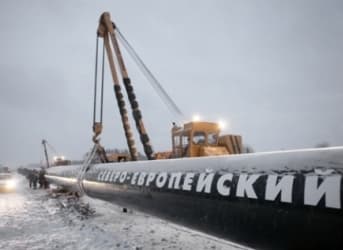Geography has a major impact on energy issues. Pipelines and energy imports frequently have massive influence on the relations of neighboring states, none more so than those between the Russian Federation and its former Soviet republics, as well as the Eastern European countries they dominated following World War Two.
These issues are particularly acute in the case of the Russian Federation’s relations with Romania, separated by Moldova, a former Soviet republic consisting of Romanian territory unilaterally annexed by Stalin in 1940 and subsequently incorporated into the USSR. Moldova now has the dolorous reputation of being the poorest of the former USSR’s European republics.
With independence fracturing the USSR in December 1991, factories closed and a strip of Moldova, known as Transnistria, east of the Dniester River, seceded. Transnistria was Moldova’s most industrialized section and its most Russified. Moscow intervened to stop a civil war over the secession, which killed over 700 people and since 1992 Russian troops have watched over a “frozen conflict” that leaves Transnistria isolated, unrecognized by any nation, and Moldova sundered.
In the two decades of political and economic chaos the World Bank notes, “Moldova’s unemployment rate rose from 4 percent in 2008 to 7.4 percent in 2010, and with more than one-quarter of its residents living below the national poverty line —the rate topping 36 percent in urban areas— Moldova is Europe’s poorest country.” The World Bank Development Research Group has calculated Moldova’s annual GNP per capita at $1,800.
Neighboring Romania, in contrast, has gone from strength to strength, joining NATO in March 2004 and the European Union three years later, both developments that deeply disturbed Moscow. With a GNP per capita in 2011 of $12,476, Romania now has an upper-middle income country economy, which Moldova’s citizens can only admire from afar.
Russian imports, provided by the Russian Federation’s natural gas monopoly Gazprom, are increasingly expensive, as the company regularly pegs its prices to the global market.
As the European Bank for Reconstruction and Development noted in its February 2012 report on Romania, “Romania has domestic reserves of oil and gas, but chiefly relies on Russia for its imports. There is a need to promote energy security via diversification.”
All of which makes a wide-ranging interview by Golos Rossii (“The Voice of Russia”) radio station with Romanian President Traian Basescu a must-read.
After stating, “Your radio station is engaged in a misinformation campaign, at least that’s true for your Romanian webpage,” Basescu added, “I want to make it clear that, though Romania has been stepping up national security, this policy has never been aimed at Russia. Today, we don’t believe that the Russian Federation could pose a threat to the Romanian national security.”
As for Russian concerns about possible Romanian claims over Moldova Basescu said, “I believe that the citizens of Romania and the citizens of the Republic of Moldova are one and the same nation. But we live in two independent states.”
Basescu was also questioned, “I want to ask you about the gas as well, about the "South Stream."
South Stream is a proposed natural gas pipeline designed to transport Russian natural gas through the Black Sea to Bulgaria and further onwards to Greece, Italy and Austria, as an alternative to the proposed Nabucco pipeline, with construction scheduled to begin in December 2012, with the pipeline to be completed three years later.
In a lengthy answer Basescu replied,” We support the version of the South Stream project that is supported by the EU. And we are a part of the EU. Thus, for us the Nabucco project is a priority. We are taking part in that project; Romania owns 16% of the project. But we will never be against the South Stream project. And when we received an offer from Russia to make the first exploration tests in Romania’s economic zone, our answer was positive. But we are a part of the European energy policy. For how long the Russian Federation sell its natural gas to us – directly or via intermediaries – taking into account that there is a Gazprom pipeline going through the territory of our country. Of course, the Russian Federation is our partner, and we offered Gazprom an opportunity to set up its underground gas storage facility on the Romanian territory. The issue became especially acute when there were problems with Ukraine. We preserve our wish to remain Gazprom’s partner. And when you want to find out something about Romania, please contact me directly..”.
ADVERTISEMENT
So, long and short of it? Romania is now firmly ensconced in the Western camp, and Moscow had better get used to it. That said, Bucharest is not so xenophobic so as to sever its relationships with a neighbor and the energy field is regarded as one area where cooperation can not only continue, but deepen. Accordingly for Putin, Romania is offering more than half a loaf, and South Stream represents a future source of Revenue for the Kremlin, unlike Nabucco.
By. John C.K. Daly of Oilprice.com


















